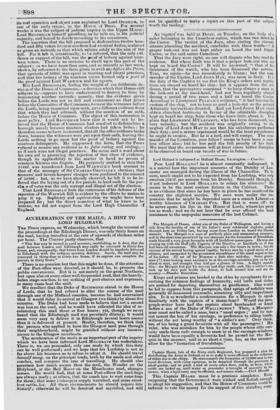ACCELERATION OF THE MAILS; A HINT TO LORD MULGRAVE.
THE Times express, on Wednesday-, which brought the account of the proceedings at the Edinburgh Dinner, was only thirty hours on the road, having travelled at the rate of upwards of thirteen miles per hour. The Courier justly observes, that
" This feat may be turned to good account ; establishing, as it does, that the mail between London and Edinburgh may easily be conveyed in thirty-five hours, and, consequently, that letters from London should be regularly delivered in Edinburgh with the ordinary morning delivery. Surely, the mail may be conveyed in thirty-four or thirty-five hours, if an express can complete the journey in thirty hours."
There is no question but that this might be done, if the attention of the Post-office were directed, as it should be, to promote the public convenience. But it is not merely on the great Northern, but upon almost every other well-frequented road, that the heavily- laden stage-coaches, to say nothing of post-chaises and expresses, in many cases beat the mail. We recollect that the Duke of RICHMOND stated in the House of Lords, that he had refused to alter the course of the mail through one of the Midland counties, because he had ascertained that it would delay its arrival at Glasgow (we think) by about five minutes. The Duke had been made to believe that not a second was lost on the road, and be would have ridiculed the idea of ac- celerating this mail three or four hours: yet, though we never heard that the Edinburgh mail was peculiarly dilatory, it would seem very easy to deliver it in Edinburgh several hours sooner than it is delivered at present. Really, therefore, we think that the persons who applied to have the Glasgow mail pass through their neighbourhood, might be gratified without any inconve- nience to the Glasgow merchants.
The acceleration of the mails is an important part of the inquiry which we have been informed Lord MULGRAVE has undertaken. There is, we are persuaded, only one mode by which this duty can be well performed; and we hope that his Lordship is not so far above his business as to refuse to adopt it. He should travel himself incog. on the principal roads, both by the mails and other coaches, and compare the Fete of travelling. He should also ascertain bow much sooner than the mail, the Wonder on the Holyhead, or the Red Rover on the Manchester road, changes horses. He would find, that at some Post-offices the mail-bags are always ready ; at others, that the coach has to wait some time for them; that some innkeepers supply wretched, and some excel- lent cattle, &c. All these circumstances he should inquire into himself; otherwise he will be deceived sad mystified, and will not be lualified to make a report on this part of the subitei
worth the reading. '




















 Previous page
Previous page